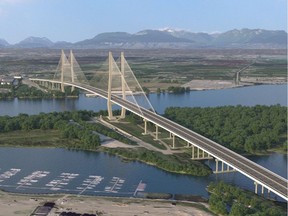Brian Cochrane, Walter Canta and Nav Malhotra: Expanding infrastructure construction jobs can help restart B.C. economy
OPINION: IN the face of the economic destruction this unprecedented health crisis has caused, it’s time for all three levels of government to truly think big with the biggest infrastructure construction program we have ever seen.

Article content
“Construction is a matter of optimism — it’s a matter of facing the future with confidence.” — Architect Cesar Pelli, designer of Petronas Twin Towers and other iconic buildings worldwide
B.C.’s workers and businesses are suffering badly as our provincial economy takes what could be the biggest hit since the Great Depression because of COVID-19. But there is still great hope for the future.
No matter how long this deadly virus troubles our province and the world, ultimately we will all come out of isolation — and need to get our economy going again to repair the enormous damage done.
Some sectors of our economy are now devastated, with little hope of an early recovery. Tourism, hospitality, entertainment and retail are facing most of the 500,000 job losses predicted by the Business Council of B.C.
But one sector remains mostly intact and — with appropriate health and safety measures, rigorously followed — can help lead the province out of financial trouble: the construction industry.
B.C. now needs to plan for the largest infrastructure construction program ever seen to stimulate our battered economy by creating new jobs, investment and tax revenue.
But as union leaders representing thousands of construction workers, the safety of our members is the first priority.
That is why we have designed and submitted to WorkSafeBC this week a comprehensive proposal for appropriate and effective health rules to maintain the safest possible construction worksites, which are very different from all others.
Construction workers can keep making an enormous contribution to the province if they can work safely — especially building hospitals and health-care facilities — with construction revenue and taxes helping ensure our economy doesn’t contract even more disastrously than the predicted decline of seven to 12 per cent, or possibly greater.
What’s more, when this novel coronavirus has been neutralized and, hopefully, a vaccine developed, B.C.’s economy will still be need of urgent care.
That is where construction infrastructure projects can come to the rescue.
The provincial, federal and municipal governments have wisely already committed significant funding for B.C. projects — such as the Broadway SkyTrain extension, the Pattullo Bridge replacement, and the Kicking Horse Canyon highway expansion — where our members are already working.
But in the face of the economic destruction this unprecedented health crisis has caused, it’s time for all three levels of government to truly think big and stimulate our economy with the biggest infrastructure construction program we have ever seen.
U.S. President Franklin D. Roosevelt helped lead his country out of the 1930s Depression with the New Deal, the most significant government infrastructure building program the world had seen, inspiring other countries to do the same.
We should be no less ambitious today if we want to overcome the economic adversity facing us for years to come.
So let’s keep building the Broadway SkyTrain extension but go well past Arbutus Street, as currently planned, all the way to the University of B.C. And let’s shorten the time frame — building the SkyTrain line not just longer but faster, hiring extra workers to get it done.
B.C. needs more hospitals, as planned in Surrey, more schools, more replacements for transportation bottlenecks such as the Massey Tunnel, more rapid transit to create a greener, sustainable economy, more energy-efficient buildings to reduce greenhouse gases and save on costs.
And if Community Benefit Agreements are used as they have been on several important projects, they will ensure that local, Indigenous, disabled and women workers get significant job opportunities on these projects, including apprenticeships and training that will last a career.
All these projects will help the province enormously in several ways:
First, by getting B.C. back to work, with construction workers spending their wages to support local businesses crushed by COVID-19.
Second, all of these infrastructure projects will create new jobs and new career opportunities for thousands of British Columbians put out of work.
Third, these are definitely not “make work” projects — they will create much-needed infrastructure that will serve our province for decades to come.
And, lastly, these projects can be financed with record low interest rates that minimize debt servicing costs, making it possible to amortize larger expenditures over a long period of time.
COVID-19 may have kicked the hell out of B.C., but we can use this crisis as a golden opportunity to make our province a much better place in the long run.
Construction workers, unions and the industry are optimistic about B.C.’s future and standing by to help. Let’s get to work.
Brian Cochrane is business manager of the International Union of Operating Engineers Local 115; Nav Malhotra is business manager of the Labourers Union Local 1611; Walter Canta is principal officer of the Teamsters Union Local 213.

![July 2 1991. Main observation tower (left) looms over west and east wings, of Oakalla Prison, while noose (above) marks the site of gallows built over an old elevator shaft. Ran July 5, 1991. 91-4313. ( for noose photo - see original negatives) Gerry Kahrmann/ Province. [PNG Merlin Archive]](https://smartcdn.gprod.postmedia.digital/vancouversun/wp-content/uploads/2019/11/252160273-oakalla_prison_-7-w.jpg?quality=90&strip=all&w=232&sig=J3pwd92uWiGJ_Mv9Nf1pxA)



Postmedia is committed to maintaining a lively but civil forum for discussion. Please keep comments relevant and respectful. Comments may take up to an hour to appear on the site. You will receive an email if there is a reply to your comment, an update to a thread you follow or if a user you follow comments. Visit our Community Guidelines for more information.